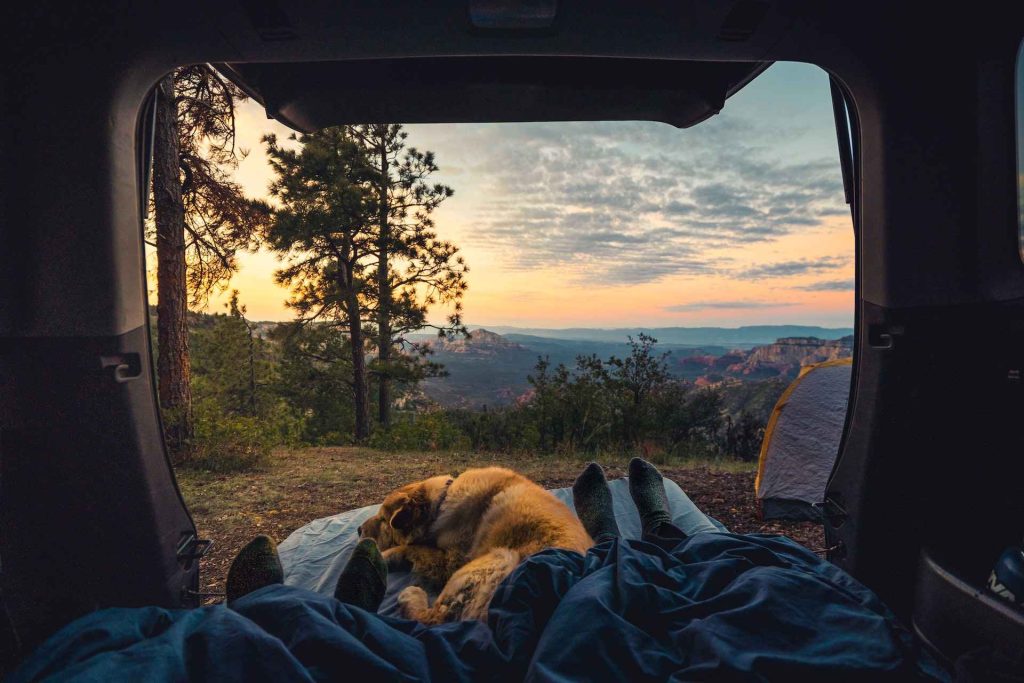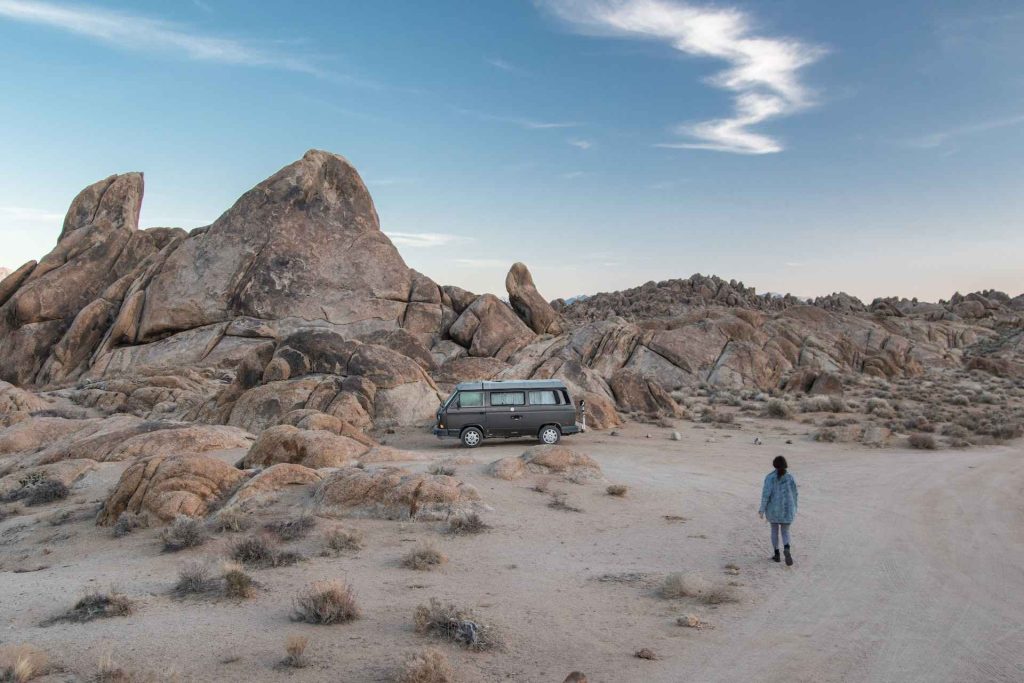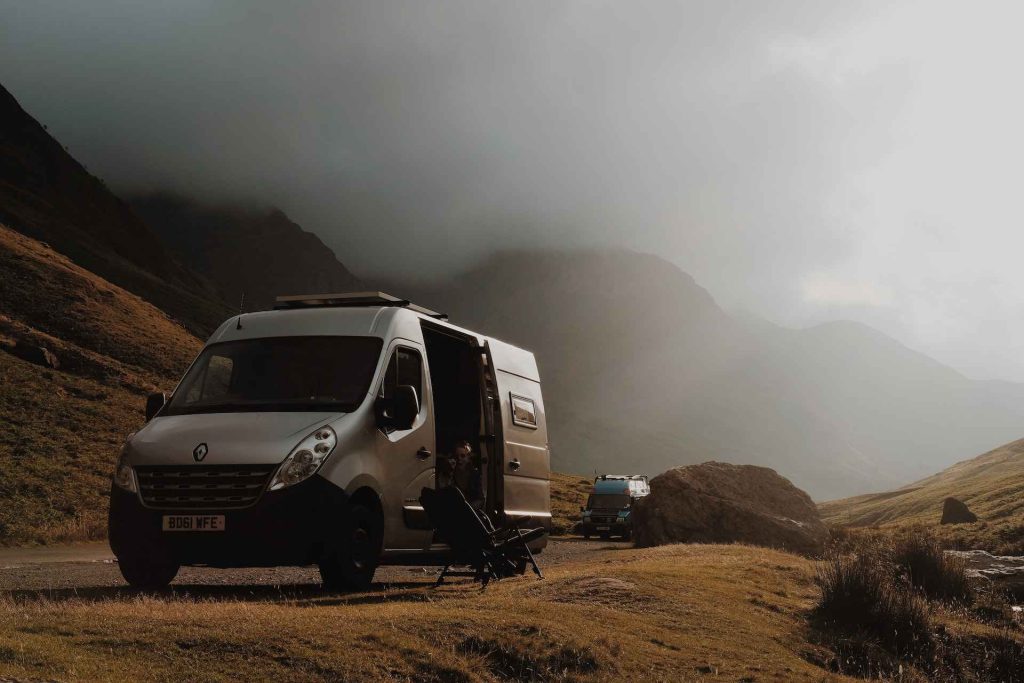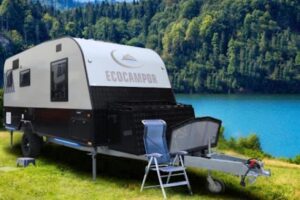With rent consuming upwards of 50% of many people’s paycheck, it’s easy to assume that eliminating rent as a monthly expense is a fast path to working less and saving more.
But is it?
Is living in an RV cheaper than renting?
Let’s dig into the various aspects of RV life and find out!
Cost of RV life
There are an overwhelming number of factors that contribute to the overall cost of living in an RV full-time.
Food, entertainment, utility usage, and location are just a few of the factors that determine a person’s overall cost of living, and in turn, how much money they might save by not renting an apartment or house. Surprisingly, some people actually experience spending more money living in an RV over renting an apartment or house.
In these next few sections, I’m going to do my best to lay out the main factors that influence the overall cost of RV living, how it might compare to the cost of renting, and how you can begin to estimate if living in an RV to save money could work for you.

Size of an RV
The size of a camper has a massive effect on the overall cost of using it as a primary residence. This is especially true if the RV inhabitants are prone to moving around a lot and change their camping location frequently.
Gas mileage
Large recreational vehicles are heavy. They’re heavy and they are not particularly aerodynamic on the road. What does this mean? This means that large RVs get infamously low gas mileage on highways. Veteran RVers report that their Class A motorhomes usually get around 8 mile-per-gallon (mpg) when fully loaded.
Class C motorhomes do better, with many Class C owners saying they can average 15 or so mpg on highways. Travel trailers of comparable size lower the gas mileage of their tow-vehicles similarly. A powerful SUV will not get anything close to its typical gas mileage while it is towing a travel trailer.
On the other hand, small rigs can get relatively great gas mileage. Camper vans regularly hit the low 20’s for gas mileage, and teardrop trailers hardly influence the gas mileage of a powerful truck.
Insurance
Fuel isn’t the only expense that increases as RVs get larger. Insurance costs on large RVs are often double or triple the cost of insuring a small rig. Similar to a house, the more there is to insure, the higher the annual premium will cost.
Some folks, not fully understanding what they are buying, purchase a vacation liability RV insurance plan to insure their rig. This type of insurance is not sufficient for full-time RVing and does not cover accidents on the road. Full-time RVers fully comprehensive RV insurance.
Maintenance
People who live in RVs know that if it can break, it will break. It’s not a matter of if, but a matter of when.
Lots of RV means lots of opportunities for things to break. When a large RV needs repairs, these repairs can be quite costly. Not only that, but preventative maintenance such as cleaning and performing inspections takes much longer on a big rig than it does on small rigs.
Depending upon the size and condition of an RV, maintenance costs have the potential to represent a very large, or very nominal amount of money.

Compared to renting…
Tenants do not have to worry about many of the aforementioned costs associated with living in an RV.
Houses and apartments don’t move, so there are no fuel costs associated with them besides commuting to work and other essential places. People with long daily commutes should consider if working remotely online and living in an RV could save them significant money on fuel.
Many renters opt to purchase rental insurance, but even the priciest rental insurance premiums are much lower than RV insurance.
A benefit of renting an apartment or home over owning one is that all maintenance should be 100% taken care of by the landlord. Renters are off the hook for maintenance and repair costs. Pretty sweet, right?
Campground fees
An unfortunate fact about this modern world we live in is that it is not easy to find and access places where a person can sleep for free. This leads many RVers to primarily rely on RV parks for semi-permanent residences and long-term camping solutions. The campground fees at these RV parks can be thought of as the RV equivalent of paying rent.
But don’t start thinking that all RV parks are created equal because they certainly are not. Newer RV parks with clean, modern facilities and many amenities can cost between $1,000 and $2,000 per month. RV parks that cater specifically to full-time RVers and seasonal outdoor industry workers are generally in the $300-800 range.
Monthly rentals at old out-of-the-way RV parks can be secured for less than $200. Just know that these types of RV parks essentially only offer a spot to park and nothing else. The landscape will probably be pretty barren, and your RV neighbors are likely to be folk who intentionally live on the outskirts of major cities, away from prying eyes.
Should you rent per night, per month, or per year?
Without a doubt, your best chance at securing the cheapest monthly rate at an RV park is to sign a year-long agreement. RV park and campground owners frequently offer discounts to full-time RVers who want to stay somewhere for many months or full years at a time.
Monthly rentals at a campground or RV park are also a sweet deal and are your cheapest option if you don’t have the scheduling freedom for a year-long commitment in one location. These deals are perfect for seasonal workers who need a home for themselves and their rig for 3-5 months at a time.
A non-sustainable habit that some RVers fall into is not planning ahead and having to consistently pay nightly rates to park their camper. Nightly rates at RV parks are significantly higher than monthly and yearly rates and should be avoided if possible.
Boondocking

Do you want to know the real secret to saving money while living in an RV? It’s boondocking.
Boondocking refers to camping on public lands in a car or RV without access to power hookups, water connections, or waste dump stations. These campsites are absolutely free for public use and operate on a first-come, first-served basis.
Most of the best boondocking locations in the United States are found on Bureau of Land Management (BLM) land and National Forest Service (NFS) land.
Boondocking, hands down, results in the most significant money savings that RVers can achieve. It’s a tough lifestyle though. Boondockers have to drive to more remote locations to camp, are around fewer people and emergency services, and must track their utility usage much closer. But it’s all worth it for those isolated sunrises over the desert as you lay cuddled up in bed.
Compared to renting…
Like I said above, campground and park fees can be considered an RVer’s “rent”. Typically, full-time RVers spend much less money annually on RV park and campground fees than most people spend to rent a house or apartment annually.
THIS WILL NOT ALWAYS BE THE CASE. Whether or not a person can save money by living in an RV park instead of renting is an incredibly subjective thing.
For example, a person paying $3,500 a month to rent a studio apartment in Los Angeles could save tons of money by moving into a $1000 a month RV park. Alternatively, someone paying $500 a month to rent a room in a house with roommates would double their monthly rent by moving into a $1000 per month RV park.
If saving money on rent is inspiring you to live the RV life, look at your current financial situation very closely and project forward to what costs you will incur in an RV.
Truth bomb: just because some people save money living in an RV, does not mean that you will save money living in an RV.
Lifestyle
As with living in a rental house or apartment, lifestyle choices weigh heavily into an RVer’s overall cost of living. This phenomenon is accentuated by the fact that oftentimes people living in campers full-time are working with small budgets and limited income.
Constant movement vs. sitting still
RVers who move around the most, spend the most.
Fuel costs really eat into a budget when traveling in an RV. While part of the attraction to RV life is the potential for constant travel, many people find that they can’t actually afford to be constantly driving their camper around to new, exhilarating areas to live.
Those who save the most by living in an RV lean into the stationary RV life. These people are signing 6-to-12-month RV park agreements and contentedly sitting still while enjoying a simple life of minimalism and cheap living.
It’s wander-lusty people with romantic ideas of life on the road that can struggle to afford living in an RV. These people think they can live in an RV and spend 100% of their time in vacation mode, traveling non-stop, and paying premiums for last minute campsites, hotel rooms, and attractions.

Don’t get me wrong, you can absolutely live that way and it’s a whole lot of fun. But that RV fast-travel lifestyle is expensive, and gas and campground fees will eat up a lot of money fast.
Entertainment
A camper can begin to feel quite small eventually, and this leads some full-time RVers to use going out as an excuse just to leave the “house”. Going out for food or drinks occasionally can turn into a daily event. What was once a rare and special treat turns into a way to kill time.
The same goes for entertainment expenditures like going to see a movie, bowling, or tickets for a concert. If you spend much more money going out on the town while living in an RV than you did while renting, your savings potential goes way down.
Hikers, tent-campers, and overall nature-enthusiasts have an easier time saving money while RV living, as they are more content spending time on free activities outside. A hike to a viewpoint for sunset is much cheaper than buying a handful of $12 cocktails.

Compared to renting…
Theoretically, an entertainment budget should hardly change when a person moves into an RV. In reality, the RV lifestyle typically inspires much more, or much less money to be spent on daily and monthly entertainment. As life changes, habits change with it.
It’s up to the RVer to make sure they don’t blow their potential savings by pursuing expensive entertainment.
So, is living in an RV cheaper than renting?
I wish this matter was so cut-and-dry that I could give you a yes or no answer.
The truth is, living in an RV is only cheaper than renting if you make it cheaper than renting.
Every decision made while living in an RV will play a role in the overall cost of maintaining that lifestyle. I know people who have used living a simple life in an RV while working full-time as a way to save up money for a down payment on a house and land.
I also know people who have saved up a bunch of money, quit their jobs, moved into an RV, and spent a year traveling fast and living large. They lived a much more lavish lifestyle than they did while renting an apartment and had the best trip of their lives. Was it cheaper than renting? Nope! Was it worth it? To them, absolutely.
While I can’t say for certain if living in an RV is cheaper than renting, I can say this: if you move into an RV full-time, you significantly increase your money-saving potential. And for many people, yes, living in an RV is cheaper than renting.
Frequently Asked Questions
Full-time RV life is daunting, and our readers have some questions.
Where is the best place to boondock in America?
The USA has incredible boondocking sites in every state and region. With that said, many boondockers and road nomads gravitate towards the deserts of Utah, Arizona, and New Mexico for long-term boondocking.
How big of an RV should I buy for full-time RVing?
For a single person or couple, a campervan or medium-sized travel trailer should be enough RV. A family of 3 or 4 should look into buying a large travel trailer or Class A motorhome.
Conclusion
Have you been debating RV life for a long time now and still can’t decide if it’s for you? Here’s your sign to be bold and pull the trigger on your dream. Just go for it. Be smart, be prepared, plan ahead, and when the moment is right, make that leap. You’ll be so glad you did.
Remember, nothing is forever. You can always pivot and change directions at any time. There is no “right” way to do life.
Chase your happiness, chase your dreams.
And as always, happy camping.



